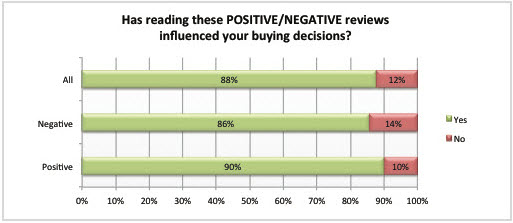This post comes to us from Michael Johnson, SEO Associate at SEOM Interactive:
When it comes to deciding where to shop, consumers turn to reviews. Companies with an online presence have reviews published by Google that give consumers a voice. They rate their individual experiences through stars, photos, and their opinions. These ratings are of paramount importance to small business owners.
According to a survey on Marketing Land, “90% of respondents who recalled reading online reviews claimed that positive online reviews influenced buying decisions, while 86% said buying decisions were influenced by negative online reviews.”
How Google Calculates Your Score
Google uses a Bayesian Average scoring system, which takes existing information related to the data set in order to calculate a score, rather than base the score solely off of the mean of the total reviews. Scores are calculated this way to “minimize the impact of large deviations or assert a default value when the data set is small.” This means Google is taking factors into account that we cannot see to try to estimate a more accurate average of what the score would be if there were a lot of reviews.
While this method is beneficial in some ways, it can also be detrimental. For small businesses, in particular, it can significantly harm their Google ratings. It is believed that the Bayesian Average method goes out the window after 30 reviews and the overall ratings start to reflect a basic mathematic average, but there is nothing concrete that proves this theory. Whether this magic number threshold exists or not, it is important for our clients to get as many good reviews as possible in order to avoid a negative rating.
A Tale Of Poor Ratings
At SEOM, our SMB clients are often looking for ways to get positive reviews in order to help their business stand out in search because ultimately, those reviews are what drive consumers to choose them. Recently, one of our clients faced a situation where an ex-employee had his friends and family negatively review our client’s company on Google, leaving our client with 10 fake 1-star reviews and 10 5-stars. The listings average score was a 1.7 though.
In addition to having a low score, the top 3 reviews that were featured on our client’s listing were hateful messages that contained personal, misleading, violent or inappropriate content. This is against Google’s Terms of Service, and in working with Google, we were able to get some of the more heinous reviews removed.
In an effort to gain more positive reviews to combat the negative ones, we created a link to the client’s Google listing for them to share with customers. This link was customized to send users directly to the review box with 5 stars checked. All a user had to do was click the link, log into Google, and leave their review. After sending this to previous customers and including the link on the client’s website, real reviews started to come in. To further this effort, we used the thumbs-up feature Google offers to “like” the positive reviews.
After 2-7 days, we started to see a change in our client’s scores. The top three featured reviews in Google search were all positive and up-voted reviews. Google keeps private what influences their rankings and algorithms, so while we can’t confirm that up-voting helps the rankings, we can see that it worked in this case.
In the days that passed, their rating went from a 1.7 to a 3.7. Today, this client’s average is now a 3.4 with 23 reviews. This score reflects the mathematical average, which tells us that Google could have already started doing away with their Bayesian system.
Moving Forward
Google recently announced that they are moving away from the Bayesian model and have started testing new ways of scoring, slowly rolling updates out to their rating system. Now the review scores will be taken and used to give the straight-forward, arithmetic average.
As with any problem we encounter, it was important for us to be open and willing to learn from our client’s difficulties. It was discouraging to see our client’s score drop to a 1.7 because of a personal issue, but by implementing a strategy to obtain more reviews, we were able to turn that around.
If your business receives negative reviews, don’t panic! SEOM Interactive can show you the necessary steps to remedy the situation.


